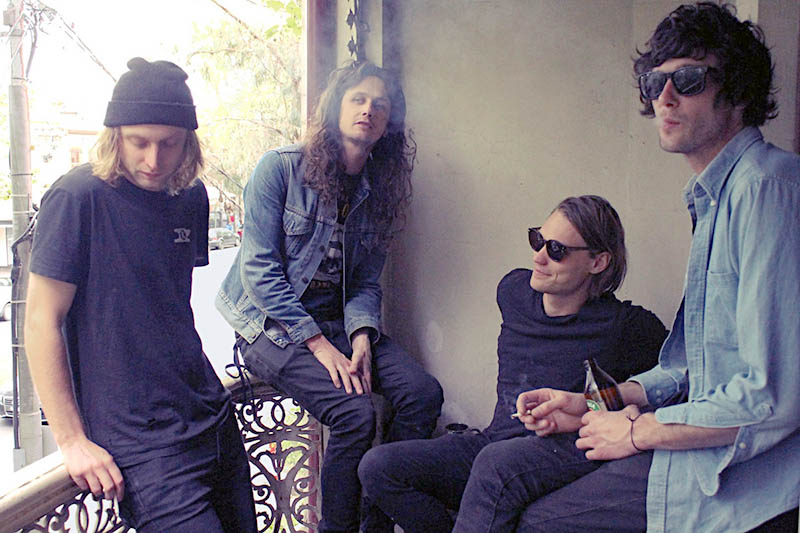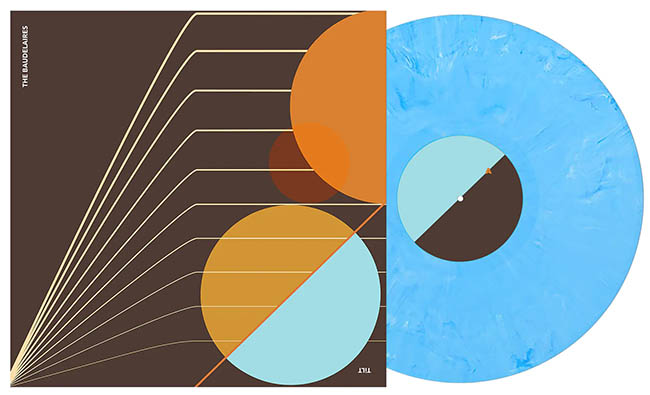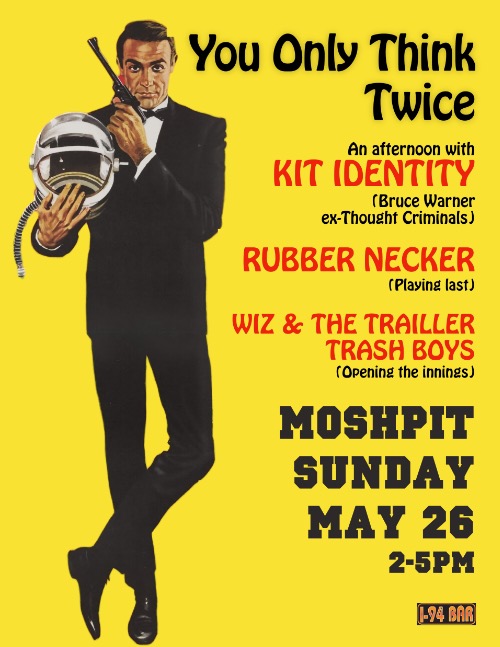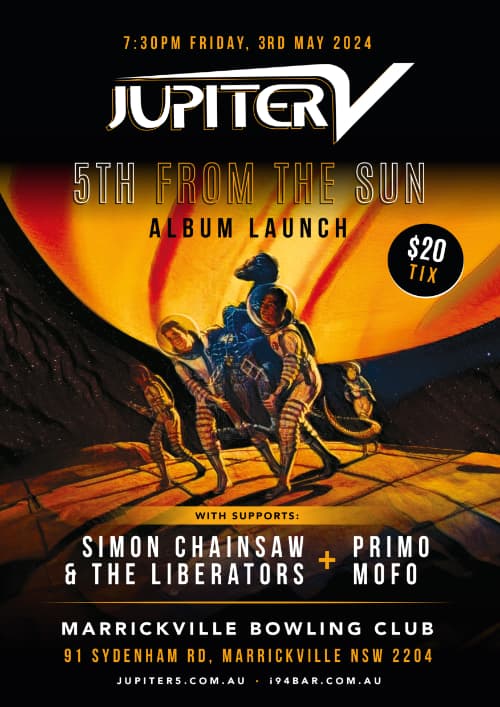
Melbourne band The Baudelaires take their name from Charles Baudelaire, a talented, troubled, decadent and ultimately doomed 19th century French poet and essayist whose writing is said to be the vanguard of the Modernist Movement.
The Baudelaires, in contrast, evoke the spirit of psychedelic exploration, a trippy triangulation of bent Texas psychedelia, Krautrock discipline and the dearly departed elastic brilliance of Yura Yura Teikoku. Six years after releasing their debut album, “Musk Hill”, The Baudelaires have returned with a new album, “TiLT” on Wally Kempton’s effervescent Cheersquad Records.
Patrick Emery spoke to drummer Blair Wittstadt.
First things first. when and how did the band come together?
I’m going to guess 2013, and the first EP was 2014, and first album was 2016.
It was with Grischa (Zahren-Bergner), the guitar player, and Benny [Reid], the other guitarist. I think they had another drummer, or two, not really sure. Then I met them and joined on drums. We played a few gigs around and recorded a demo, just the three of us, we didn’t have a bass player.
Then we got in Jayden, who played in Child; he played bass for us for a while, then Brett Marshall, who’s the singer in Mightiest of Guns, joined on bass. And then after he left to join Cash Savage, we got my brother Ryan in, who’d just returned from living overseas. So he joined just before we did the EP.
Who came up with the name?
I’m going to say Grischa. It’s not after the Lemony Snicket character, but after the poet I’m told!
Is Grischa the only member of the band who’s read 19th century French poetry?
I’m going to say yes! I definitely haven’t and Benny definitely hasn’t. I’m not sure about Ryan. Grischa’s definitely your go-to for everything French and poetry.
What’s it like playing with your brother in the band? Any fraternal friction?
Pretty good actually. I think we got pretty lucky with our brotherly bond. We’ve shared the bus through Europe a few times, plus we used to live together too. We’re close but we’re also pretty different. So, no problems having a brother in the band. And mum’s pretty happy about it!
It’s been six years since you put out “Musk Hill”, back in 2016. Why the long break?
Everyone will say it, but COVID knocked out two years. But before that, our processes are pretty slow compared to other bands. Back then we were still trying to go to the rehearsal studio once a week. Then life changed a bit so we stopped going once a week and we weren’t writing as much.
We did Europe tours off the back of “Musk Hill” and on the second one, we recorded half of the new album. That was 2018. Three or four songs off “TiLT” were recorded in Europe in 2018, so they were ready to go. Then Benny moved away for a bit, then the COVID thing happened, a couple of other things happened. Benny moved to Halls Gap in the Grampians and he’s still out there. So it’s a little bit hard to get together but when we do, it’s really, really good, so it’s been a bit of a blessing when we’re in the room together.
So how did the recording in Europe come about? Was that happenstance or was it lined up beforehand?
When we were over there the first time, we were doing the whole Spotify ‘Discover weekly’ and that’s how we came across this band, New Candys. They’re based in Venice. We listened to them quite a lot over there and when I came back, I contacted them because I was starting my own booking business and they turned out to be my first international act that I brought to Australia.
So we played with them on their East Coast tour and they were great. When they went back to Europe, we were talking to the guitar player, and he owns his own recording studio just outside Venice. So when we booked our next tour, we booked a couple of shows around Venice and then we had a few days off, so we stayed at his home studio and bashed out a few songs. I think most of the songs made it onto the record.
When you’re writing songs, how does the creative process work? Is it a case of coming up with a riff and colouring that in, or is it about creating a mood?
We do tend to write together, though usually someone will bring something in to work from. So on the new album, ‘Roller Vaseline’, Grischa came with a bass line and the song is built off that bass line. A lot of it is a small idea that someone has and we just build on that together. There’s one cover on the album but the rest of it will have come from an idea that we’ve built on.
I was going to ask you about the cover on the album, “On Solid Rock”, which I understand was recorded originally by Out of Darkness in the late 1960s. How did you come across that song?
It turns out, when I was doing the really boring stuff for the album, the credits and the licensing and all that shit and I was looking for the credits for that song. We thought it was by a band called Quest. My brother’s best mate over in the UK, a guy called Kieran, his dad had a band called Quest and they played this song and they had a really poor quality demo of them playing it. Ryan loved it and brought it back and said if we were going to cover a song, this would be sick to do, no-one knows what the fuck it is, never been released. So we thought it’d be a fun song to play, really fun to record.
Then, when I was doing the licensing, I said to Ryan that we’d have to ask Kieran who wrote it. So I ended up looking around myself and it turned out it was written by this band Out of Darkness, who I’d never heard of. I think they’re like a heavily Christian rock band in the 1960s and it was really hard to find information on them!
Once you realise it’s a Christian rock band, the title “On Solid Rock” makes a lot more sense.
It does make sense. Grischa played with the lyrics a little bit to make it not as Christian. It’s a good song, it’s a little bit different from the original.

There’s a certain elasticity in your songs. When you’re recording, how do you know a song is finished?
Good question. I honesty really don’t know. A lot of our songs don’t really follow that verse-chorus-verse structure. A lot of our songs don’t have choruses in general. As far as structure, that tends to come reasonably quick. But a lot of it is about the parts. There’s never really a time is truly finished because we don’t usually play it the same way live every time. It’ll change and shift a bit, I’ll do something slightly different on the drums, Ryan’s always thinking about his bass lines and trying to make them better. I’m not sure they’re ever finished.
We really didn’t know how to finish “On Solid Rock” with that stupid ending on the outro. But when we were recording it, Fox, the producer got up out of his chair and ran over to Benny’s guitar pedal and started twisting all the knobs and playing around with them and that finished the song!
On a song like “Gordon”, that’s just one chord I came up with in my house and I showed Benny and said just keep playing that, I’ve got a drum beat for it. That’s the whole song, it goes for six and a half minutes. Grischa does a good job in moving a song, peaks and troughs throughout.
Do you put a lot of thought into sequencing of tracks, especially the side 1/side 2 concept for a vinyl record?
Yeah, absolutely. Both the albums were sequenced with vinyl in mind. We thought about it a lot. For me, there was no other option than to open the album with Gordon because that was a pretty solid choice. “Nancy Neuze” was a pretty quick choice to open the second side.
Closing the record was a bit tougher. We didn’t know what to do with “On Solid Rock” because it stands out as the more poppy song, more upbeat. Putting that last, I didn’t really know. I thought “Over Down” would be last but I think the closing works. It flows well. We all definitely had input into that and that’s what we landed on.
You mentioned how the songs evolve live. How faithful are you to the recorded version of a song or do you just roll with the moment and see where it goes?
As far as structure goes, any big change from the recorded version would probably be a mistake. They do generally stick to the album, as far as structure, but what each of us is playing might change. Ryan might change his bass line, Benny will add something different – he’ll always play his solos different and Grischa can do his own thing too. But it’s mainly faithful to the recorded version.
You’ve been to Europe a couple of times. Do you have plans to return there?
I’d love to. But nothing solid at the moment. We mentioned it the other day, saying how good it would be to get over there again. Ryan’s got a two-year-old child, so it’s little bit harder to get over there now. But we’d love to get back there.
We released the album overseas with the help of a European label and also an American label. I was speaking to the European label and he said after Covid it’s extraordinary competitive over there now, it’s really, really hard to get a slot on a line-up. We’ve always enjoyed playing there, sometimes it’s a big outdoor space, other times it’s a tiny living room size, like a café. You don’t know what you’re going to get but it’s always a good time. I’ll see the guys on Thursday so I’ll plant the seed again.
‘TiLT’ is out now through Cheersquad Records.




